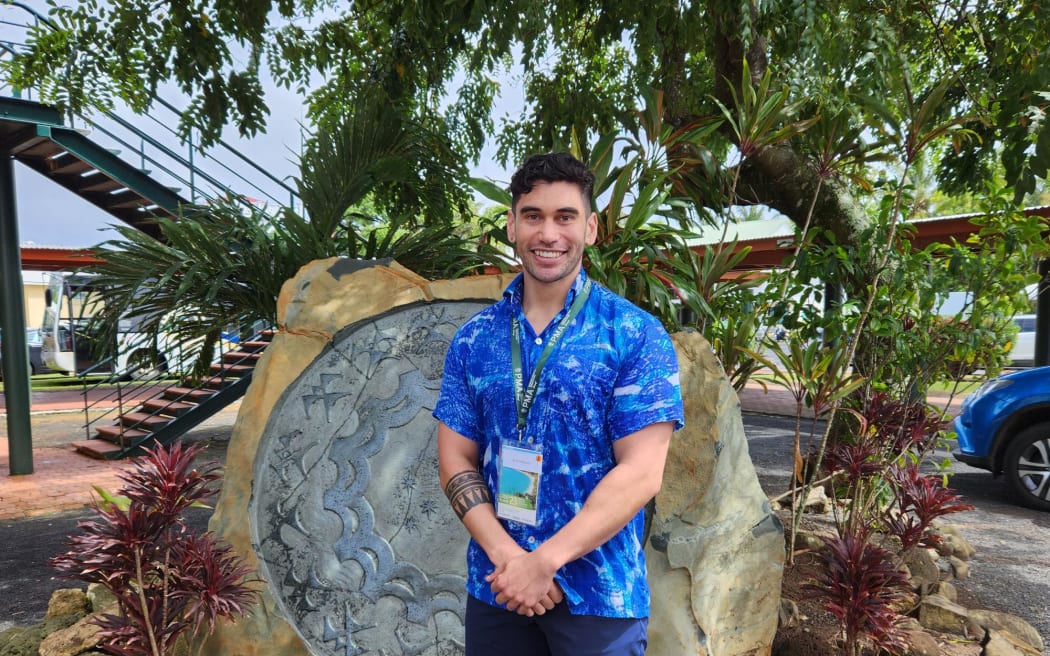Battling the stigma of mental health across the Pacific
Wednesday 13 September 2023 | Written by RNZ | Published in Health, National, Pacific Islands, Regional

Dr Sam Manuela surveyed about 10 percent of the Cook Islands population for a mental health study. Photo: RNZ Pacific/Caleb Fotheringham 23091204
Mental health remains a stigma in the Pacific, but there might be some good news out of the Cook Islands. Caleb Fotheringham of RNZ reports.
About 600 doctors, nurses and health professionals made the trip across the region to attend the Pasifika Medical Association Conference in Rarotonga which began last Wednesday, local time.
One of the main items on the agenda was mental health.
Seiuliali'i Dr George Tuitama, who looks after the mental health services in Samoa and is the country's only psychiatrist, said there was ignorance around mental health.
"There's always a stigma with mental health patients and discrimination," Tuitama said.
"I don't think it's something that's going to go away anytime soon; the mental health disorders are sort of [seen as] cursed beliefs.
"But when you start crying and being isolated and drink too much, they don't think it's a health issue - they don't think they need to come to the hospital for that one."
Last week, Samoa's Ministry of Health announced the formal establishment of the National Mental Health Committee, to address the growing concern of mental health issues in Samoa.
Director-General of the Ministry of Health, Aiono Dr Alec Ekeroma, said mental health was a critical aspect of health care.
In the Cook Islands a one-of-a-kind mental health study surveyed about 10 percent of the nation's population.
Dr Sam Manuela, who conducted the study, found Cook Islanders born in the Pacific have better outcomes than those born in New Zealand.
"So there is something happening here in the Cook Islands that is good for our mental health," Manuela said.
He said there were fewer people living in the Cook Islands experiencing severe symptoms of depression compared to New Zealand.
But there was an increase in young people in the Cook Islands reporting symptoms of anxiety and depression - which was in line with global trends.
"A lot of the feedback that we got back from administering the survey around the islands was that people felt that there is stigma here in the Cook Islands around mental health, but they're glad people are talking about it more as well," he said.
"That's a good sign that people are becoming a bit more comfortable talking about mental health issues."
Dr Jimmy Obed, Vanuatu's first and still only psychiatrist, said people continue to deal with the stress caused from the back-to-back intense tropical cyclones that arrived within days of each other in March.
Now they need to think about the fast-approaching next cyclone season.
"We're going into cyclone season pretty soon at the end of this year, November to April the next year, so that's something we also have at the back of our mind - how we are going to recover, whilst we recover from the twin cyclones now preparing for this cyclone season."
Dr Sione Vaka, from the University of Waikato, ran a session on supporting people with dementia.
Vaka said Pacific people needed to see themselves in mental health services.
He said current services in New Zealand and some in the region were based on a foreign framework and not on the indigenous ways of thinking.
"We're very collective and circular in how we think; we're like in a circle in terms of movement, whereas our health systems are very individual, and linear," Vaka said.
Vaka said a Pacific-based health care focuses on building a relationship and later asking illness questions.
"You start to get to know them, where they come from, what are their relationships.
"For us, I need to know you, before I tell you what's inside my heart, and if I don't know you, I don't trust you, and I won't tell you what's bothering me," he said.
Seiuliali'i Dr George Tuitama said cultural and traditional beliefs needed to be integrated in mental health treatment.
"Spiritual and traditional and cultural aspects have to be taken into consideration," Tuitama said.
"We can not treat patients fully with mental disorders and mental illnesses without encompassing their full cultural background."
The Pasifika Medical Association Conference winds up on Monday local time in Aitutaki, in the Cook Islands.














































